- Home
- Franklin Horton
The Borrowed World (Book 3): Legion of Despair
The Borrowed World (Book 3): Legion of Despair Read online
License Notes
Copyright © 2016 Franklin Horton
Cover Art by Deranged Doctor Design
Formatting by Deranged Doctor Design
Editing by Felicia Sullivan
All rights reserved
Amazon edition
This book is a work of fiction. People, places, events, and situations are the product of the author's imagination. Any resemblance to actual persons, living, dead, or living dead, is purely coincidental.
No part of this book may be reproduced, stored in a retrieval system, or transmitted by any means without the written permission of the author.
Table of Contents
Acknowledgements
Prologue
Chapter 1
Chapter 2
Chapter 3
Chapter 4
Chapter 5
Chapter 6
Chapter 7
Chapter 8
Chapter 9
Chapter 10
Chapter 11
Chapter 12
Chapter 13
Chapter 14
Chapter 15
Chapter 16
Chapter 17
Chapter 18
About the Author
Acknowledgements
Neither books nor writers develop completely of their own accord, even though writers might wish to think so. While each writer brings to the table his own indefinable chemistry that makes him unique, both he and his book are also the distillation of his thoughts and experiences. While I continue to evolve as a writer, I am assisted in that process by the many friends and influences that have shaped me and continue to work their magic on me.
Many of the ideas that I write about were first bounced around in conversations with co-workers. My friends Greg Smith, Bill Wimmer, and Adam Wade have helped live out many apocalypses with me over the years. I want to thank author Steven Konkoly, a master of post-apocalyptic fiction, who continues to answer my questions and keep me focused on the big picture. I also want to acknowledge my friend Bobby Akart who set out on this writing adventure about the same time as I did. Not only is Bobby able to produce well-crafted fiction, but he has the ability to bring like-minded people together in a way that is just as artful.
I also want to thank the book team who made this happen. My editor, Felicia Sullivan, has been invaluable in providing insight to all levels of this experience. She not only helps develop books, but writers and careers as well. I am indebted to her.
I also need to thank the folks at Deranged Doctor Design, especially Kim, who inspire me with their professionalism every time we work together. There’s also the team of readers who helped me correct and clarify: Anita Debord, Dawn Figueiras, Vicky McFadden Bowens, and Carrie Bartkowiak.
Finally, I want to thank the friends and family, both present and departed, who have been part of this life-long adventure. Without the experiences we shared together, there would be nothing to distill and nothing to write.
Franklin Horton
March 8, 2016
Prologue
The past weeks had been difficult ones for the people of the United States. ISIS operatives had seeped through the borders and launched a widespread coordinated attack against the infrastructure of the country. Aided by radicalized Muslims living in plain sight, the attacks were swift and deadly, targeted toward producing long-term devastation.
Trucks bombs were detonated on bridges and in tunnels critical for the transportation of people and goods. Residents of San Francisco, New York City, the Upper Peninsula of Michigan, and the Hampton Roads area of Virginia found themselves cut off from the most used travel and supply routes. In the current economy, it was doubtful those landmark bridges and tunnels could ever be rebuilt.
Several mortar rounds led to the collapse of the Wolf Creek Dam in Kentucky and the unleashing of half a trillion gallons of water from Lake Cumberland onto the folks of Nashville, Tennessee. It was unknown at this point how many people lost their lives to the flooding. The loss of electricity restricted the flow of information, preventing many from learning they were even at risk until it was too late.
Knowing the reliance of modern America on the luxury of electricity, the grid was a primary target of the terrorists. They relished the thought of pushing America back to a prior century. Critical transformers at junctures in the grid were destroyed by explosives and weapons fire. There were no spares available. The transformers were custom-made in Europe and Asia specifically for their location within the grid. They could take up to a year to make, then they had to be transported via ship, rail car, and finally by a specialized trailer to the site of their installation. With dozens destroyed, it was unknown how long replacements would take. Some sections of the country could have to wait years to get their power restored.
With the failing of the electrical system came the unavoidable consequences of power loss. People lost heating and cooling, refrigeration, the ability to heat water and cook on electrical appliances. Those requiring electrical-powered medical devices in order to live were dying. Cities could no longer pump water into storage tanks, nor could they treat it to make it safe for drinking. Certain critical municipal functions could be run off generators, but for how long? There was no guarantee of a steady supply of either diesel or propane.
Besides the electrical grid, the other primary targets of the terrorists’ plan were the major refineries that turned crude oil into fuel. Utilizing portable weapons systems, the terrorists precisely dropped mortar rounds onto those facilities. The capacity to create fuel was destroyed, along with the existing inventory of fuel stored in on-site tanks. As this began to sink in, the president issued an Executive Order restricting all sales of fuel to the public. It was now only available to the military, law enforcement, and first responders. The president tasked state governors with this fuel seizure, utilizing their state troopers and National Guard troops.
The result of this fuel restriction was that millions of Americans found themselves trapped on the road. Those fortunate enough to be stranded on the beltways of their home cities faced potentially harrowing journeys home through unfamiliar sections of town. Those unfortunate enough to be traveling when they ran out of fuel were stranded along the interstate highways, at rest areas, and at truck stops.
One group of coworkers from Southwestern Virginia found themselves far from home on the day of the attacks. They were hundreds of miles away in the capital city of Richmond when they awoke to a power outage and only a vague idea of what had transpired overnight. There was a disagreement among the group as to the necessity of leaving town without attending the meeting they’d come for. Some felt that the terror attacks were just a bump in the road that would amount to little more than an inconvenience.
“We survived 9/11,” one of them said.
Without fuel and electricity, there were also those among the group who felt that there was the potential for immediate chaos and eventual societal collapse. They had little news to go on. Cell phone connections were becoming sporadic. Even if they could not agree on what the societal effects of such an attack might be, it was eventually agreed upon that they should at least all return home to be with their families in this time of national crisis.
As they started their journey home, they were at an interstate travel plaza when the Executive Order restricting fuel sales was announced. This resulted in a riot which left one of their group dead. When they attempted to escape the chaos of the travel plaza, a man attempted to carjack them and one of the men, Jim Powell, was forced to kill the carjacker with a pistol that he carried concealed, a strict violation of his employer’s policy. Unable to obtain fuel,
their vehicle soon ran dry and they were forced to proceed on foot, leaving their useless car behind. They spent the night in a darkened, powerless hotel at a highway exit. The night was filled with the sounds of violence that further reinforced to some that societal collapse was a strong possibility.
In an effort to clean up the mess of stranded travelers abandoned along the highway system, FEMA established camps and ran buses in search of the stranded. Some among the group felt this was obviously the solution to their problem. They would go to the FEMA camp and wait for a bus ride home, courtesy of the government.
This contingent was shocked to find that this belief was not shared by all of those in the group. Jim, along with his friends Gary and Randi, opted to not put their fate in the hands of FEMA. Jim and Gary were both prepared and aware individuals who traveled with weapons and carried Get Home Bags just in case an event such as this were to ever befall them. Their plan was to go home along the Appalachian Trail and use its remote footpaths to avoid the more populated – and dangerous – areas between them and home.
Alice and Rebecca did not agree with this plan. They took a bus to the FEMA camp, where they remained until they realized that FEMA really had no plan for getting them home at all. FEMA just wanted them off the exits and out of the hair of the people living along the highways. It became clear to Alice and Rebecca that if they ever wanted to get home, they were going to have to leave the camp and find another way.
This was not a simple request. While leaving was not prohibited, it was not encouraged. No supplies or aid would be given to those who wanted to leave. Readmission was also forbidden. They were only able to leave by stealing some provisions and stowing away on a bus with another camp resident. However, they quickly learned that their new friend, Boyd, was not stable. His behavior was erratic and violent. After an argument, he killed Rebecca and fled in the night, leaving Alice alone on the road. In a cruel twist of fate, as Alice made it back to familiar territory she crossed paths with Boyd again, waking up to find herself tied up in his basement with no idea if she’d ever see her family again.
The journey undertaken by Jim, Gary, and Randi was no picnic. There were multiple violent encounters that left them changed from the people they’d once been. After several weeks on the road, they made it to Tazewell County, Virginia, each of them a harder version of themselves. Gary split off from the group at this point and headed toward his home. Randi and Jim proceeded together and it took them a day longer to reach Jim’s home.
Jim’s arrival home was not the idealized event that he’d imagined. Instead, he came home to find his family being victimized by Charlie Rakes, a prisoner set free from the local jail when the food ran out. Charlie had taken Jim’s mother and son hostage in an attempt to extort food from Jim’s family. Within fifteen minutes of arriving home, Jim had killed again, putting a round in Charlie’s head and leaving his body for the coyotes that haunted the perimeter of the farm. The next day, Jim was able to fill his diesel truck from the fuel tank on his farm and use it to return Randi to her family.
Throughout their journey home, each anticipated being in the arms of their family. Each had the dream of a reunion that shone like a beacon and kept them walking each long day through blisters, aches, sickness, and hunger. Each imagined a set of smiling faces that would welcome them home. They imagined rest and recovery, sitting outside in a patio chair regaining strength from the depletions and exhaustions of the road. Each had a fantasy.
No one found what they expected.
Chapter 1
Gary’s House
Richlands, VA
As Gary walked the last miles home, his hometown was as quiet as he’d ever seen it. It was the only small town for nearly an hour in any direction. If people wanted food, liquor, or building supplies this was where they came. It was always busy. There was always traffic. As a large coal town, it never closed. In the middle of the night, men in dirty work clothes with reflective safety stripes were driving service trucks, fueling up, stopping for cigarettes, or changing shifts. The sound of trains, the sound of coal trucks, were ever-present.
With the Executive Order that limited the available fuel to authorized emergency vehicles, most folks had already used up the limited supply they kept around their homes for mowing or running generators. Only a few vehicles moved on the streets now. There was a golf cart disappearing into a neighborhood. A shirtless man in shorts and flip flops rode a gas-powered scooter with a cigarette hanging from his lip. It was the kind of scooter that didn’t require a license and was favored by drunks who had lost theirs. In some ways the town had shifted backward a century, making it okay again to walk in the center of the streets or ride a horse through town. Yet the congenial atmosphere of those long-gone days, even the hectic efficiency of two weeks ago, had departed. Even the twenty-four hour grocery store was closed, as was every all-night convenience store that Gary passed.
When Gary was a child, his family had moved from their home into one a little larger in another part of town. Years later, he’d had the opportunity to go back to his childhood home. There was a sense of deep familiarity at seeing the home where he’d grown up, yet there was also a slightly alien feel, and the awareness that it was not his home anymore. Things may have looked the same, but they were different too. That was exactly how his town felt now. The same, with a disturbing undercurrent of… different.
Gary’s route took him through the downtown area where hundred-year-old brick buildings stood three stories tall. The upper floors were typically apartments. With no lights or any air conditioning, folks sat in backyards or brooded in shadowy doorways. Only the children seemed without worry, playing as children always do even in the worst of times. The adults had little to say. Some he passed met his eye or nodded, but none spoke. Even in this southern town where friendliness came naturally and everyone spoke to everyone, the people seemed dispirited. The state of the nation hung over everyone like a dark cloud.
Gary plodded the concrete sidewalk, seeing his town as he’d never seen it. The sound of his steps echoed between the buildings. After two miles, he crossed the railroad tracks and walked by the fire station. A group of volunteer firefighters sat in folding chairs in front of a garage bay. He nodded at them and they watched him pass, their conversation halting while they tried to figure him out. He wondered if they had the ability to respond to fires or if they were just unsure of where else to go. With no phones, unless they saw smoke they would not even have any means of being alerted of a fire in progress.
Beyond the fire station stood the vacant parking lot of a shopping center. A half-dozen kids were weaving on skateboards, feeling free to ignore the NO SKATING signs at this point. No one cared. They ignored his passing, which was the way he preferred it.
He approached the community food pantry and found it burned to the ground. He wondered why it had been burned. To conceal that the food had been stolen or run out? Perhaps it was because thieves were infuriated that there was no food left to steal. Gary recalled how this small town had seen so much change in his lifetime, from the boom of coal to the bust, yet they’d never needed food pantries here until recently. The media kept saying that the economy was recovering, but the lines at the pantry kept getting longer and longer and there was never enough food to give away.
Gary had not grown up with much money, but his family’s food pantry had been in the backyard. He and his brothers had to help his parents plant it in the spring and early summer. Then they helped water it when the days were hot and dry. They harvested it together and they helped preserve it for winter. It was what had to be done. It disappointed him that the once-proud people of his community now preferred this handout of stale and outdated food to raising a garden of their own. It was discouraging that such was the world his grandchildren would inherit.
He was less than a mile from his house when he could stand it no longer and the anticipation of his homecoming made him start jogging. His feet were so sore from the journey that it felt as if th
e small bones within his shoes were broken and grinding together, but he didn’t care and he didn’t stop. His pack pulled at his already aching shoulders and he felt lightheaded from burning more calories each day than he had consumed. Still he ran.
In ten minutes, he was at the foot of the driveway that his family shared with a few neighbors. He tried to continue running up it, but the half-mile road was too steep and he was too spent. He climbed as quickly as he could. In the years he’d lived here, he couldn’t recall ever walking this driveway and he was impressed with the effort it took. Halfway up, he was sucking wind. His legs were cramping and his side ached, but he knew the top of this hill was all that stood between him and his family. He started running again. He could not stop himself. Emotion welled up in him, threatening to spill over.
In the exhausting blur of his journey home, Gary had dreamt of this moment. There were many times when he, Jim, and Randi had sunken into the dark pool of their thoughts and he knew they were all thinking of the same thing: home. In his mind, he had pictured a reunion worthy of Little House on the Prairie, him ambling out of the woods near his home into a field of wildflowers and being spotted instantly by his wife. She would drop the basket of laundry that she was preparing to hang on the line and cry his name. He would step through the high grass toward his family as they spilled from the house.
He pictured his wife, his daughters, his sons-in-law, his granddaughters, all running toward him in slow motion, their arms outstretched, love radiating from them like a sunny day at the beach. He imagined he would shed his pack into the deep daisy-filled grass and run toward them. They would collide in an enormous hugging mass and his depleted body would absorb it all, the love he’d been missing on those hundreds of miles when all he could think about was the family he’d left behind. He knew it was a little sappy and over the top, but distracting the mind helped the body cope, and that was how he endured the many miles he’d come. It was one of the games he played in his head to make it home.

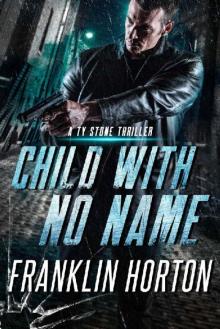 Child With No Name
Child With No Name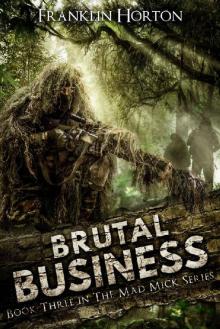 Brutal Business: Book Three in the Mad Mick Series
Brutal Business: Book Three in the Mad Mick Series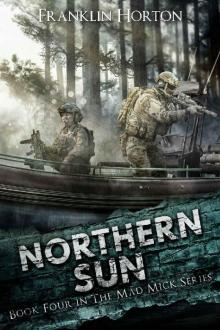 Northern Sun: Book Four in The Mad Mick Series
Northern Sun: Book Four in The Mad Mick Series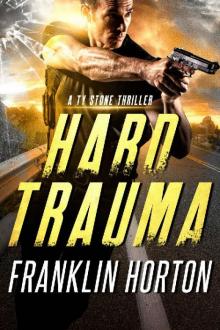 Hard Trauma
Hard Trauma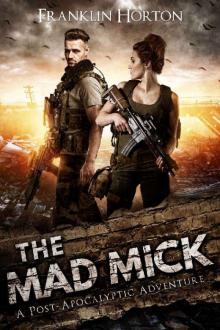 The Mad Mick: Book One of The Mad Mick Series
The Mad Mick: Book One of The Mad Mick Series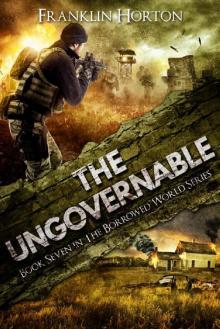 The Ungovernable
The Ungovernable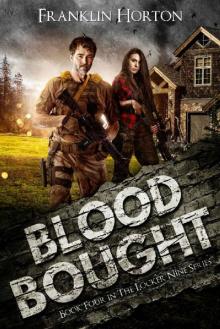 Blood Bought: Book Four in The Locker Nine Series
Blood Bought: Book Four in The Locker Nine Series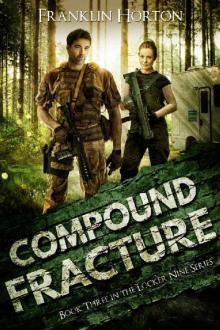 Compound Fracture
Compound Fracture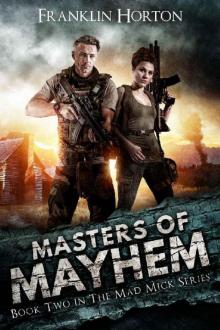 Masters of Mayhem
Masters of Mayhem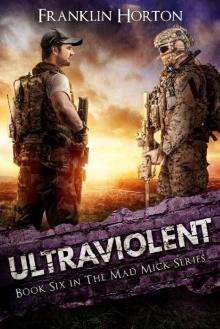 Ultraviolent: Book Six in The Mad Mick Series
Ultraviolent: Book Six in The Mad Mick Series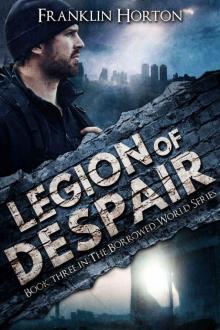 The Borrowed World (Book 3): Legion of Despair
The Borrowed World (Book 3): Legion of Despair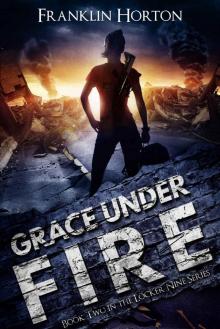 Grace Under Fire: Book Two In The Locker Nine Series
Grace Under Fire: Book Two In The Locker Nine Series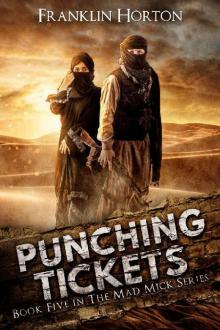 Punching Tickets: Book Five in The Mad Mick Series
Punching Tickets: Book Five in The Mad Mick Series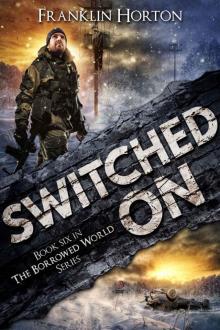 Switched On: Book Six in The Borrowed World Series
Switched On: Book Six in The Borrowed World Series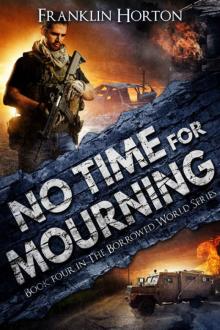 No Time For Mourning: Book Four in The Borrowed World Series
No Time For Mourning: Book Four in The Borrowed World Series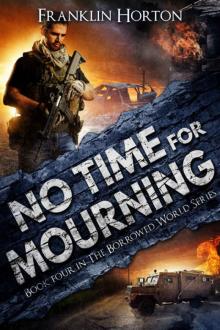 The Borrowed World (Book 4): No Time For Mourning
The Borrowed World (Book 4): No Time For Mourning Random Acts
Random Acts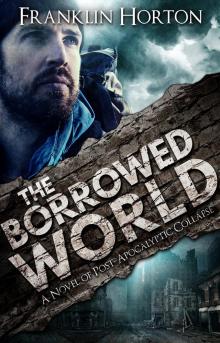 The Borrowed World: A Novel of Post-Apocalyptic Collapse
The Borrowed World: A Novel of Post-Apocalyptic Collapse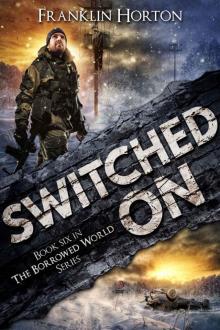 Switched On
Switched On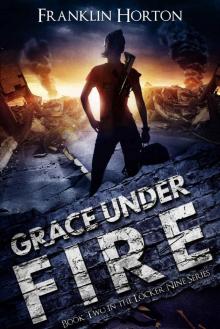 Grace Under Fire
Grace Under Fire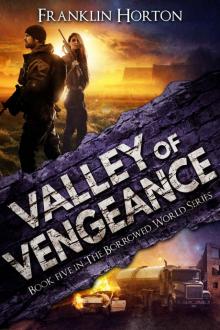 Valley of Vengeance: Book Five in The Borrowed World Series
Valley of Vengeance: Book Five in The Borrowed World Series